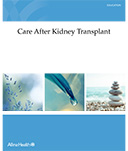
Kidney transplant
A kidney transplant is an option for patients who are experiencing end-stage kidney (or renal) disease. The Kidney Transplantation program offers transplantations from both living and deceased donors.
The care team includes a donor coordinator, recipient coordinators, nephrologists, surgeons, pharmacists, and many other staff members who are specially trained to care for transplant patients.
Kidney Transplant Video Series
- Part 1: Risks and Benefits of Transplant
- Part 2: Transplant Candidacy
- Part 3: Referral and Evaluation
- Part 4: The Waitlist
- Part 5: Types of Kidney Donors
- Part 6: Surgery and Hospitalization
- Part 7: Things to Think About
Allina Health patient education manuals

Kidney Transplant Information for Recipients
This booklet gives you basic information about a kidney transplant. You will be working closely with the members of your health care team to decide if a kidney transplant is right for you and for the best care possible. Fill out the Kidney Recipient Registration Form.

The decision to donate a kidney is personal. There are many things you will need to think about but, most important, you must choose what is right for you. You should not feel any pressure or feel rushed into making a decision.

This manual gives basic information about having a kidney transplant and choosing to donate a kidney.
Recipient
Pre-transplant
- Chapter 1: Introduction to Transplant and Evaluation
- Chapter 2: Benefits and Risks of Kidney Transplant
- Chapter 3: How to Tell if You are a Transplant Candidate
- Chapter 4: Types of Donors
- Chapter 5: Transplant Surgery
- Chapter 6: Transplant Medication
- Chapter 7: Transplant Clinic Follow-up Appointments and Labs
- Chapter 8: Lifestyle Considerations After Surgery
- Chapter 9: Financial Considerations and Insurance
- Chapter 10: Resources
- Questions related to payment for living kidney donor
- Waiting for the call
- Dobutamine Stress Echo
- Stress Echo
- Cardiac PET Perfusion Imaging with Stress Test
- CT abdomen/pelvis
- Chest x-ray
- Electrocardiogram (EKG)
Surgery
Post-transplant
- Chapter 1: Introduction
- Chapter 2: Recovery in the Hospital and at Home
- Chapter 3: Medications
- Chapter 4: Complications (Problems) After Surgery
- Chapter 5: Transplant Clinic
- Chapter 6: Returning to Your Regular Activities
- Chapter 8: Home Monitoring
- Chapter 9: Glossary of Lab Tests
- Chapter 10: Resources
Resources
If you have questions about information you found on a website, ask your transplant coordinator.
If you find a website that asks for you to register or that sells information or products and you are unsure about it, ask your transplant coordinator.
- The Scientific Registry of Transplant Recipients (SRTR) collects information about transplants performed throughout the United States. National and transplant center-specific patient outcome data is published twice a year. Information regarding Abbott Northwestern Hospital’s Kidney Transplant Program performance including average time on wait list and patient outcomes can be reviewed at srtr.org.
- Life-Source.org: LifeSource
- UNOS.org: United Network for Organ Sharing
- Medicalert.org: Medic Alert
- Kidney.org: National Kidney Foundation
- Medicare.gov: Medicare
- OPTN.org: The Organ Procurement and Transplantation Network
- ITSCC.org: International Transplant Skin Cancer Collaborative
- Medicalert.org: Medic Alert
Patient education videos
Explore the video library for trusted, easy-to-understand health and wellness education. View video library kidney topics.
If you would like a printed, spiral-bound copy, please fill out online form.
View list of manuals and prices. All sales are final.